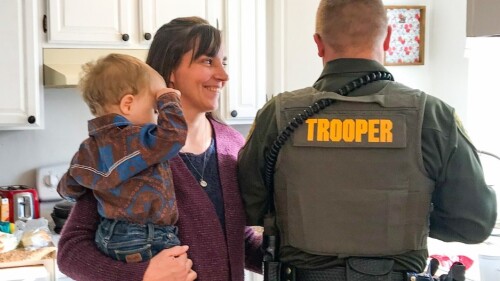Infidelity is nothing new. It received plenty of mention throughout the Old Testament, showing it was of concern more than 5,000 years ago. Accurate statistics about its prevalence are hard to nail down even today, but best estimates from various sources seem to indicate about 36 percent of marriages have experienced some degree of physical infidelity. When adding emotional affairs into the mix, the tally is more than half.
Police officers are not immune to physical or emotional affairs.
Susceptability to an affair
To some extent, cops may be more susceptible to an extra-marital affair compared to civilians, given the long and irregular hours of the job, working in close proximity and under stressful circumstances with fellow officers who might “get them” better than their spouse, and the abundance of opportunity to meet vulnerable or admiring members of the public eager to latch onto their very own authority figure.
In a profession famous for testing even the strongest relationships due to high stress, many officers too easily slip into affairs. We’ve all heard the rumors and stories surrounding friends and coworkers, or watched them struggle to save a relationship after a fall. Maybe this even describes you.
Recovering from an affair is certainly possible. Extramarital dalliances are hardly uncommon, but don’t — even if discovered — automatically mean a couple is doomed. With hard work, perseverance, and a commitment to reconciliation and recovery, marriages can survive and even thrive.
Don’t think it is easy — it shouldn’t be. A marriage or relationship is undermined when one of the partners has an affair is in trouble, and it will take more than time and good intentions to be set right. Even if remorse is sincere and forgiveness is granted, trust has been shattered, and rebuilding it will likely take years.
Rebuilding is a painful process, and a lot of couples simply cannot tolerate it. For those who can, the following steps offer the best chance of the relationship surviving after an affair:
1. Come clean about everything
The thing that most hurts — and continues to hurt — the aggrieved partner is when she or he discovers new details after believing everything has already been revealed and healing has begun. Every time something new about the affair is revealed, the already brittle trust takes another blow, and the healing process returns to square one.
Answer all questions honestly and completely. Know there will be many questions, and they will probably be asked repeatedly — to learn your spouse has cheated on you is an emotional and psychological trauma from which the brain needs to recover. That might mean processing the same questions over and over until their answers and meaning become clear. It may seem like your spouse is punishing themselves by trying to draw a complete and detailed picture, but they are not; without that picture made real the mind will suffer over what it imagines in the absence of facts. Don’t leave out details to spare your partner — that will only backfire.
2. Don’t rush your partner off their emotional roller coaster
Apologizing, promising to change and then hoping everything is back to normal is common for the one caught in an affair. That’s not going to happen. When their spouse goes on the emotional roller coaster, the guilty often respond with anger, frustration, or withdrawal and demand their spouse “Just get over it already! I said I was sorry and won’t do it again, what more do you want?”
They may not know what they want, but here’s what they need you to:
- Accept their emotional roller coaster and to go on it with them.
- Put aside all defensiveness and stonewalling.
- Validate their feelings of betrayal and anger. Denying their validity or minimizing their impact is an emotional betrayal that says “Your feelings about this are less important than how they affect me.”
- Be vulnerable. Leave yourself open to more pain than you ever imagined in the greater service of rebuilding the relationship.
- Give them time. It will almost certainly take a year or more for their brain to process and incorporate the betrayal, come to grips with this new “history” of the relationship, and decide to move forward.
- Give them patience, room to lash out, and your commitment to staying present while they do.
3. Accept that they get to monitor you
Levels of privacy and trust you enjoyed before are gone, maybe for good. Deal with it. Trust must be rebuilt for a relationship to survive, and that means allowing your partner to determine how. If it is through total transparency, so be it. If an abundance of alone time, online gaming, hanging down at the local bar, or whatever else might have been your private time is what led you astray, consider it gone. That might change as trust comes back, but the onus is on you.
4. Get counseling
An affair is a symptom of a larger problem. Perhaps not in your relationship, but maybe just within you. A skilled professional is not emotionally invested in the pain, confusion, and anger that led to or resulted from the affair and can offer insight and clarity that would be missed trying to fix everything yourselves. A therapist offers an environment of accountability and safety that allows for optimal healing.
Very often, couples become stuck in the “blame game,” with each bringing up and dwelling on the grievances they hold toward the other, and arguing about who is more to blame for breakdowns in the relationship. Counseling helps couples learn to own what they are each responsible for, how their individual missteps hurt the marriage, how to make necessary changes, and how to move past cycles of blame.
Thinking you are strong enough or smart enough to go it alone is a trap. The smartest, strongest, and wisest among us flail when things hit too close to home or when blinded by emotions.
5. Get tested for STDs
This is both practical and symbolic. If you’ve been intimate with someone other than your spouse or partner, being tested and taking other steps to ensure their health and safety is critical. Symbolically, it acknowledges the risks you took, owns them, and says you are taking corrective steps and thinking of both of your well-being. If you’ve been sexual at home while in the affair, you both need to be tested.
6. Put time into the relationship
It is time to bring your “A game” again. You may be ashamed, you may wonder why she or he would even want you around anymore, and you may feel unworthy of love and affection, but if your partner is committed to fixing the relationship, it’s time to start dating again with all the enthusiasm of the first time around. Accept your pain, own the shame, work on forgiving yourself and your partner, and fight for your marriage like never before.
7. Discuss what the betrayed party needs to feel safe
A huge part of rebuilding trust is honoring what the betrayed person needs to feel safe. This may mean giving up going to favorite places or activities, changing jobs, avoiding contact with certain people or crowds, or otherwise making significant lifestyle changes.
8. Be honest about your ability to stay faithful
Quite simply, monogamy just might not be in your DNA. If you are not wired for faithfulness, be brutally honest about it. If marriage or commitment is not for you, you will likely never be happy forcing something merely because of social convention or even genuine love for your would-be partner. Being honest and letting them go is ultimately more loving than repeatedly hurting them until they’ve had enough.
Or, if you realize that you are a mismatch doomed to fail, better to bring it up early than wait for the inevitable collapse.
Conclusion
Humans are frail and prone to failing. We also have a remarkable capacity for repair and reconciliation. If you’ve fallen but want to commit to fixing what is broken, following these principles will increase your likelihood of success and of rebuilding the trust that has been shattered.
This article, originally published on November 04, 2015, has been updated.










